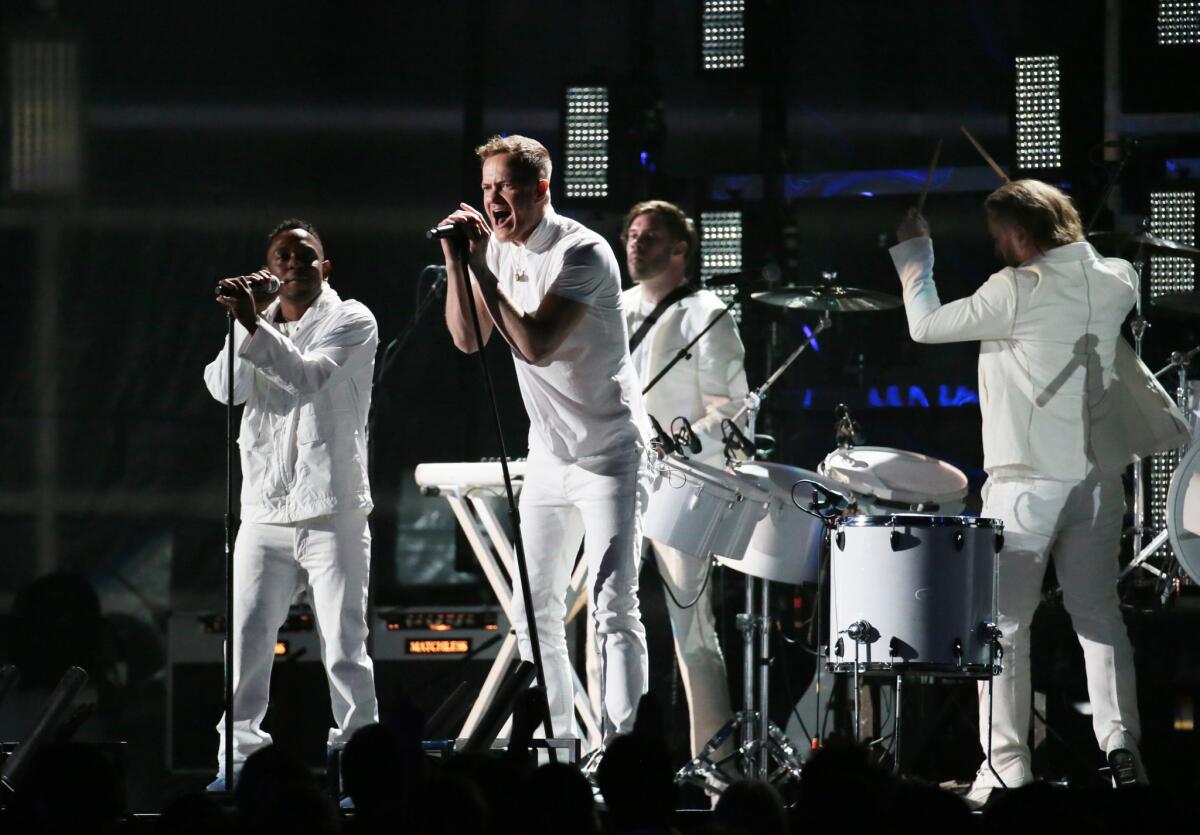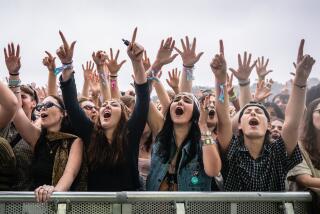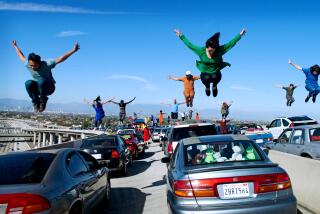Made in America organizers detail festival plans at community meeting

- Share via
The impending arrival of the Made in America festival in Los Angeles hasn’t been without controversy.
Back in April when Jay Z stood on the steps of City Hall alongside Mayor Eric Garcetti to announce plans for his two-day festival to take over downtown’s Grand Park during Labor Day weekend (Aug. 30-31), there was already concern from city officials.
How will the festival affect downtown? What will it look like? Which streets will be closed? How many people will be there? Festival organizers looked to answer those questions during a community meeting Tuesday night at City Hall.
About two dozen downtown residents and business owners filed into the Public Works boardroom to hear from representatives of festival sponsor Budweiser as well as the United Way (some proceeds of the event will benefit area branches of the nonprofit) and Diversified Production Services, the entertainment promotions company that has partnered with Roc Nation and Live Nation to stage the festival.
“We’re only successful if this can be more than a music festival,” said Mike Thompson, brand manager for Budweiser. “Similar to Philly, we see it as an opportunity to contribute to the city.”
But the point of the meeting was to show what a large-scale music festival would look like in downtown Los Angeles, and organizers detailed, at great length, their plans.
With just a dozen acres of space and bookended by the Los Angeles Music Center and City Hall, Grand Park -- with its lush grounds, interactive fountain plaza and eye-popping bright pink seating -- has yet to welcome an event of this size.
There will be three stages, all named after American entertainment icons. The main Marilyn stage will be erected on the City Hall steps facing Spring Street; a secondary Dylan stage will be at the intersection of 1st and Spring streets; and the James Dean stage, which will showcase DJs and electronic acts, will stand near the park’s splash pad.
The performances will shift back and forth between the Marilyn and Dylan stages, with the James Dean stage operating on an independent schedule. An exhibition skate park with a dedicated DJ will be built inside festival grounds, and five beer gardens will offer several brands of Budweiser. No hard alcohol will be sold.
Attendees will enter from one of four entrance gates at South and North Hill Street and South and North Broadway. Entrance into the north or south gates is chosen at ticket purchase for fans to decide if they will drive to the festival or will enter through a Metro station (passes do not include parking).
Organizers said early sales showed 12,000 ticket buyers indicated they would be driving to festival grounds and entering the south gates and 7,000 indicated they would be taking public transport to the entrance at the Metro Temple Street/Union Station stop. Access is only permitted through one gate and there is no re-entry into festival grounds.
Gates will open at noon on both days, with the first act scheduled to go on at 1:30 p.m. and headliners wrapping at 11 p.m. The festival grounds will be built to accommodate a capacity of 40,000 attendees, but organizers said they are anticipating only 30,000 to 35,000 attendees each day.
Partial and full closures on major downtown arteries, including Main Street, Spring Street, Hill Street, Grand Avenue, Broadway, 1st Street, 2nd Street and Temple Street, appeared to be in effect for up to 13 days based on the detailed slide show that organizers presented.
Crews will begin to construct the space on Aug. 23, more than a week before the festival. The six-day build will include aggressive overnight work, the production firm handling the build said at the meeting.
Cheryl McDonald, 67, who resides at the nearby Higgins Building Lofts, said after the meeting that apart from volume and traffic, her concern was the location.
“It’s going to be a lot of people. I think traffic is going to be problematic. I’m worried about peripheral people wandering the street,” she said. “My biggest concern, though, is the wisdom of taking a public park on a holiday weekend and taking away the access and restricting it to people who can afford a ticket.”
Residents and business owners who were present pressed for details. They wanted to know how many trucks would come in and out of the area during construction, how businesses and administrative buildings would be affected (particularly the L.A. Law Library), how much signage and fences would be erected and what plans were in place to curb underage drinking.
Organizers attempted to address these issues, but attendees huffed at not being able to quiz city officials who approved the festival. Downtown Area Director Sara Hernandez told residents that the mayor’s office and city officials were open to holding additional meetings to address their concerns.
Tuesday’s meeting was held at the request of Councilman Jose Huizar, whose district includes the park. Huizar had previously requested city services not issue any permits for Made in America until it could be properly vetted and expressed a desire for the community to be included in the process “sooner rather than later.”
”When you’re talking about a proposed event of this magnitude, with 50,000 expected, multiple-day street closures, beer and for-profit ticket sales at a public park, it is imperative that we have an open, inclusive dialogue in ensuring it’s a good fit for the neighborhood and if it is, that concerns are mitigated well in advance,” Huizar said in a statement issued in April.
The Labor Day weekend concert will feature a Jay Z-curated lineup that includes Kanye West, John Mayer, Imagine Dragons, Iggy Azalea, Juanes, Afrojack, Rise Against, Weezer, Sublime With Rome, Metric, Capital Cities, Chance the Rapper, Cypress Hill, Gareth Emery, Rita Ora, Nipsey Hussle, ZZ Ward, Hit-Boy, DJ Mustard, A Tribe Called Red and Kendrick Lamar.
West is one of a number of acts who will pull double duty and play the inaugural L.A. edition of the festival as well as the one running simultaneously in Philadelphia. It will be the first time a major music festival has happened at the same time on opposite ends of the country
Made in America was launched in Philadelphia in 2012, and the inaugural festival generated more than $10 million in revenue for the city. Like L.A., the festival in Philly is hosted in the middle of the bustling city on the historic Benjamin Franklin Parkway, a tree-and-sculpture-adorned boulevard that makes up the spine of Philadelphia’s museum row.
“It’s certainly not the easiest site to go to,” Thompson offered when a resident asked why organizers picked Grand Park as the L.A. location for Made in America. “But the idea is to expose people to different music and attract a diverse crowd. Jay wants the festival to be in an area that is more accessible -- easily and economically.”
Twitter: @gerrickkennedy
More to Read
The biggest entertainment stories
Get our big stories about Hollywood, film, television, music, arts, culture and more right in your inbox as soon as they publish.
You may occasionally receive promotional content from the Los Angeles Times.








